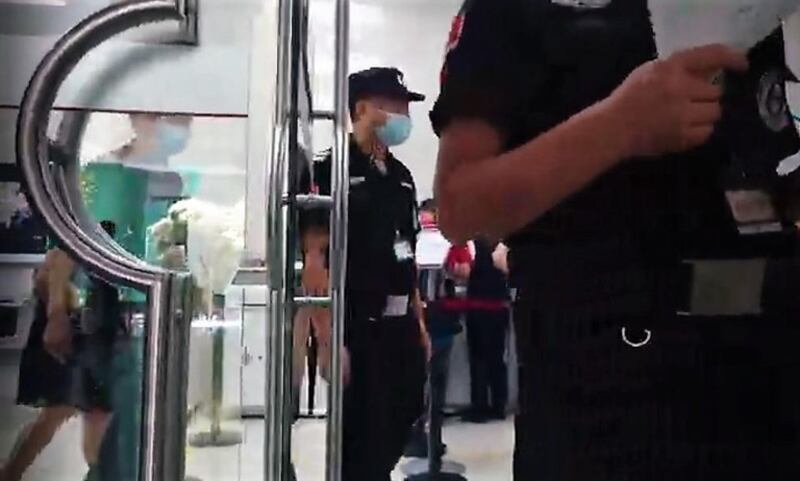Hong Kong residents have been lining up at branches of state-run banks in the southern Chinese city of Shenzhen to withdraw funds in recent days, waiting several hours after making appointments to get hold of their cash, Radio Free Asia has learned.
The Luohu branches of the Bank of China, the China Construction Bank and the Industrial and Commercial Bank of China were packed on Thursday with Hong Kongers who had crossed into mainland China via the Lo Wu border checkpoint, which has run its own immigration operation since Hong Kong’s 1997 return to Chinese rule.
Several security guards were on duty at the doors of each bank, with batons and riot shields stacked at the ready, and at least 20 chairs set out for waiting depositors.
A notice placed outside the Luohu branch of the Bank of China warned depositors that there would be a "wait of at least 4-5 hours" for withdrawals.
Given the tight security, depositors were extremely wary of explaining their reasons for withdrawing their money, but the long lines come amid concerns about the Chinese economy and the liquidity in its banking system.
Customer A from Hong Kong said he was told to wait despite having booked an appointment to withdraw funds ahead of time.
"Even if you made an appointment, you still need to wait in line," the security guard told him. "That's the rule."
"That's not what the [manager] said yesterday," Customer A replied, insisting that he not be identified for fear of reprisals. "He said I could come right over and pick up the money if I made an appointment."
Limits on withdrawals
A member of the Bank of China's customer service team said withdrawals of more than 200,000 yuan, or about US$27,800, now require appointments to be booked at least one day in advance, and that different banks and branches have different requirements.
Some banks are limiting withdrawals to 100,000 yuan (US$13,900) a day, the staff member said, and appointments are typically required for any withdrawal over 20,000 yuan (US$2,780).
Repeated calls to the three banks' Luohu branches to make an appointment rang unanswered during office hours on Thursday.

One depositor whose progress was observed from start to finish by Radio Free Asia lined up for several hours outside the branch. But when they got inside, they were given a number and made to wait for more than an hour inside.
Only one employee was visible in the branch, and asked the depositor several times for the reason for the withdrawal. They were asked to sign multiple documents and enter multiple passwords, alongside a thorough ID check.
While they eventually managed to withdraw 60,000 yuan (US$8,350), the entire process lasted around five hours.
Frozen accounts
Some depositors said they had been refused permission to withdraw funds remitted to mainland China from Hong Kong, on the basis that their accounts had been frozen pending investigation for suspected "fraud."
"They told me there was an issue with my funds," Customer B said. "The policy in mainland China is such that they would even freeze an account with 4,000 yuan in it."
"We're talking the kind of money you could get through in a day, and they're still holding it up," she said. "They said the details didn't match up."
Several Hong Kong residents who asked not to be quoted confirmed that they had made fairly small remittances to mainland Chinese banks, which were then frozen due to suspected money laundering, including one payment of 5,000 yuan to help an elderly relative.
Chinese financial affairs commentator Si Ling said liquidity is extremely tight in mainland China, and more and more people are rushing to get their money out of Chinese banks.
"Investors can see that the investment environment in mainland China is deteriorating at an accelerated rate," Si said.
"And mainland China is introducing more measures to restrict Hong Kong people from withdrawing funds."
Si said the process of withdrawing money is being made deliberately onerous, to slow down the outflow of money and prevent a liquidity crisis.
"You have to report any amount you withdraw now, and the worse the liquidity crisis gets, the more panic there will be," he said.
In July 2022, the government moved to stave off the crisis amid a mortgage repayments strike and widespread protests over frozen accounts at rural banks.
Commentators said then that restrictions on the use of bank cards pointed to an underlying crisis in China's financial system, against the background of a wider economic downturn in the wake of the zero-COVID policy, which ended in December 2022.
Translated by Luisetta Mudie. Edited by Malcolm Foster.
